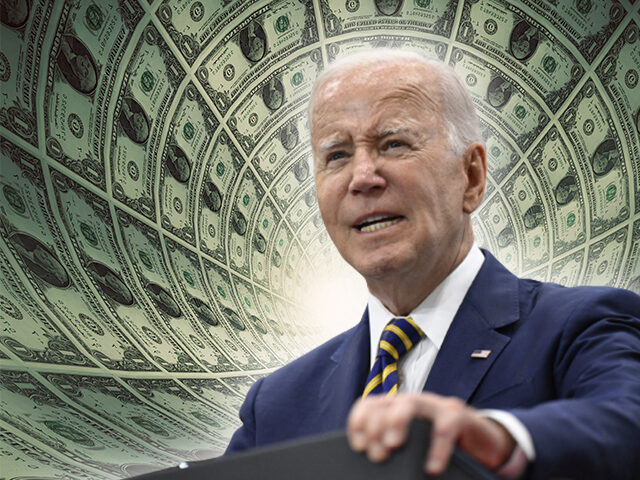Reaganomics vs. Bidenomics
Ronald Reagan once said that the country was not suffering from high inflation because people were living too well but because the government was living too well.
This was back in October 1980. Former California Gov. Reagan, the Republican presidential nominee, was debating incumbent Democrat President Jimmy Carter in Cleveland, Ohio. Inflation was running at an annual rate of 12.6 percent and had recently been as high 14.6 percent. Carter had spent much of the campaign season blaming high inflation on OPEC, the Federal Reserve, and even the allegedly spendthrift ways of the American consumer.
According to Carter, Reagan’s proposed tax cuts would make inflation worse. They were, he said, “one of the most highly inflationary ideas ever presented to the American people.”

President Jimmy Carter and former California Gov. Ronald Reagan shake hands at the start of their presidential debate in Cleveland, Ohio, on October 28, 1980.
Reagan’s response was devastating: “Why is it inflationary to let people keep their money and spend it the way they want and not inflationary to let him take their money and spend it the way he wants?”
Shortly after he took office, Reagan gave one of those not-quite State of the Union addresses that newly elected presidents deliver to joint sessions of Congress early in their first term.
“We know now that inflation results from all that deficit spending,” Reagan said.
Republicans Need to Talk About the Economy More
When Republicans choose their nominee for the 2024 presidential contest, we have no doubt they will choose someone who is able to focus on the harms Bidenomics has inflicted on the country. As we pointed out last month, this was not the case at the first Republican debate. Republicans mostly ignored the economy and barely said a word about how Biden’s policies were worsening inflation.
This tactical error is unlikely to continue for long because it is becoming increasingly clear that the Biden administration’s deficit spending has become a big part of the inflation problem. The federal deficit is expected to nearly double this year, from about $1 trillion last year to $2 trillion, according to the Center for a Responsible Budget.
The Washington Post‘s Jeff Stein first reported on this last week:
After the government’s record spending in 2020 and 2021 to combat the impact of covid-19, the deficit dropped by the greatest amount ever in 2022, falling from close to $3 trillion to roughly $1 trillion. But rather than continue to fall to its pre-pandemic levels, the deficit then shot upward. Budget experts now project that it will probably rise to about $2 trillion for the fiscal year that ends Sept. 30, according to the Committee for a Responsible Federal Budget, a nonpartisan group that advocates for lower deficits. (These numbers ignore President Biden’s $400 billion student debt cancellation policy, which was struck down by the Supreme Court this year and never took effect.)
What makes this expansion of the deficit so unusual is that it has not been driven by some kind of fiscal emergency. We are not at war. The economy is not in a depression or even a recession. If anything, it is accelerating. There are no public health emergency measures requiring the shutdown of vast parts of the economy.
In other words, the reasons spending and deficits have exploded higher in the past do not apply now.
In a note to clients, SMBC’s Joe Lavorgna explained the highly unusual circumstances and their implications. Year to date, federal outlays are up 10 percent, according to Lavorgna:
Normally, such large spending increases occur either during or shortly after recession…This is intentional as the government tries to stimulate aggregate demand and push down the unemployment rate. This happened in the late 1970s, but this policy only fed double-digit gains in inflation.
Today’s unemployment rate is just 3.8%, which is close to a five-decade low. Hence, excessive government spending is competing with the private sector for scarce resources keeping inflation higher than it otherwise would be. The Fed needs to tighten rates to overset the demand-side stimulus from rapidly rising federal outlays.
To place today’s fiscal largesse into context, the current fiscal YTD spending clip is the fastest since 2009 when federal expenditures were up 22%. But the economy was in deep recession then, and the unemployment rate was approaching 10%. The other instances when government spending was like today were around downturns, such as 1981-82, 1990 and 2002.
The higher levels of spending, and the borrowing undertaken to support it, risk creating a self-perpetuating inflation-deficit spiral. One of the drivers of higher spending is higher interest rates on federal debt. Government spending on interest is up $136 billion, or 23 percent. Those debt payments become income for holders of Treasuries, fueling inflation. The higher inflation means the Fed has to raise rates more or keep them higher for longer, which means spending on the debt stays higher for longer.
Another driver of the higher deficits is the fall in tax revenue due to a decline in collections from capital gains. That decline was driven by the lousy stock market performance last year, which was driven by the Federal Reserve’s interest rate hikes. So, it is fair to say the spending-fueled Bidenflation caused capital gains revenues to drop, pushing budget deficits even higher.
Inflation Is Set to Reaccelerate
Next week we will get the Department of Labor’s consumer price index (CPI) for August. The Federal Reserve Bank of Cleveland inflation nowcast sees a very big jump coming. On Thursday, the nowcast has CPI up 0.79 percent for the month and 3.82 percent for the year.
In July, inflation was running at 0.2 percent for the month and 3.2 percent for the year. If the numbers come in anywhere near the Cleveland Fed’s nowcast, we might be in for a bit of a jolt to markets next week.

COMMENTS
Please let us know if you're having issues with commenting.